Gum recession is a common dental issue that affects millions of people worldwide. It occurs when the gum tissue surrounding the teeth wears away or pulls back, exposing more of the tooth or its root. This condition can lead to increased sensitivity, a higher risk of tooth decay, and even tooth loss if left untreated. While various factors contribute to gum recession, smoking stands out as one of the most significant yet preventable causes. Understanding how smoking affects gum health and what steps you can take to protect your smile is essential, especially if you are looking to consult a reputable dentist in London.
The Link Between Smoking and Gum Recession
Smoking is notorious for its detrimental effects on overall health, and oral health is no exception. Research shows that smokers are far more likely to develop periodontal diseases, including gum recession, compared to non-smokers. But why does smoking have such a damaging impact on gums?
Reduced Blood Flow to Gums
One of the primary effects of smoking is the constriction of blood vessels, which limits blood flow throughout the body, including the delicate gum tissue. Blood carries essential nutrients and oxygen required for tissue repair and immune defence. When gums do not receive an adequate blood supply, they become more vulnerable to infection and less capable of healing from everyday damage caused by brushing, flossing, or eating.
Weakened Immune Response
Tobacco smoke contains numerous harmful chemicals that impair the immune system’s ability to fight bacterial infections. The mouth is home to a complex ecosystem of bacteria, and when oral hygiene is compromised, harmful bacteria can proliferate. In smokers, the immune system’s reduced efficiency allows these bacteria to attack gum tissue more aggressively, accelerating recession.
Increased Plaque and Tartar Build-Up
Smoking also encourages the build-up of plaque and tartar on teeth, which are sticky films of bacteria that form around the gumline. Plaque harbours harmful bacteria that inflame and damage gums. Over time, tartar hardens plaque into a calcified substance that irritates the gums further. This inflammation causes the gums to recede and form pockets that can trap even more bacteria.
Delayed Healing and Complications
If gum disease develops in a smoker, the healing process is significantly slowed down. This complicates dental treatments and increases the risk of serious periodontal issues. Smokers are more likely to experience persistent gum infection and bone loss around teeth, leading to severe recession and eventual tooth loss.
Signs to Watch Out For
Early detection of gum recession is key to preventing further damage. Smokers should be particularly vigilant for the following symptoms:
Teeth appear longer due to the gum pulling away
Increased tooth sensitivity, especially to hot or cold foods
Gums that bleed during brushing or flossing
Persistent bad breath despite good oral hygiene
Loose or shifting teeth
If you notice any of these signs, it is important to visit a dentist in London for a thorough examination and personalised advice.
What You Can Do to Protect Your Gums
The good news is that gum recession caused or worsened by smoking is often preventable and manageable with the right approach. Here are some effective strategies to protect your gums and improve oral health:
1. Quit Smoking
The single most effective step to protect your gums is to quit smoking altogether. While it can be challenging, stopping tobacco use allows your gum tissue to begin healing and reduces the risk of further recession. Support is available through smoking cessation programmes, and your dentist in London can guide you to appropriate resources.
2. Maintain Excellent Oral Hygiene
Brushing twice a day with a soft-bristled toothbrush and fluoride toothpaste is essential. Be gentle around the gumline to avoid irritation. Daily flossing removes plaque and food particles from between teeth where brushes cannot reach. Consider using an antimicrobial mouthwash to reduce bacteria that cause gum disease.
3. Schedule Regular Dental Check-Ups
Regular visits to a qualified dentist in London are crucial for early detection and treatment of gum recession and other oral health issues. Professional cleanings remove tartar buildup and help maintain gum health. Your dentist can also provide personalised advice on brushing techniques and recommend specialised treatments if needed.
4. Consider Professional Treatments for Gum Recession
If gum recession is advanced, your dentist might suggest treatments such as scaling and root planing (deep cleaning), laser therapy, or gum graft surgery. These procedures can halt further gum loss and restore the gumline, improving both function and appearance.
5. Maintain a Healthy Lifestyle
A balanced diet rich in vitamins and minerals supports gum health. Avoid excessive sugary foods and drinks, which promote plaque formation. Staying hydrated and reducing alcohol consumption can also contribute to healthier gums.
Why Choosing the Right Dentist Matters
Finding an experienced dentist in London who understands the effects of smoking on oral health is crucial. A skilled dental professional can provide tailored advice and treatment plans that take into account your smoking habits, lifestyle, and overall health. They will also monitor your progress closely and offer support for smoking cessation.
Moreover, dental clinics in London often have access to the latest technology and advanced treatments to effectively manage gum recession. Early intervention can prevent the need for more invasive procedures down the line, preserving your natural teeth and saving costs.
Gum recession caused by smoking is a serious condition that demands attention and care. By understanding the harmful effects of tobacco on your gums and taking proactive steps, you can protect your smile and improve your oral health. Whether it’s quitting smoking, practising diligent oral hygiene, or seeking expert care from a trusted dentist in London, there are effective ways to manage and prevent gum recession for a healthier mouth and brighter smile.








